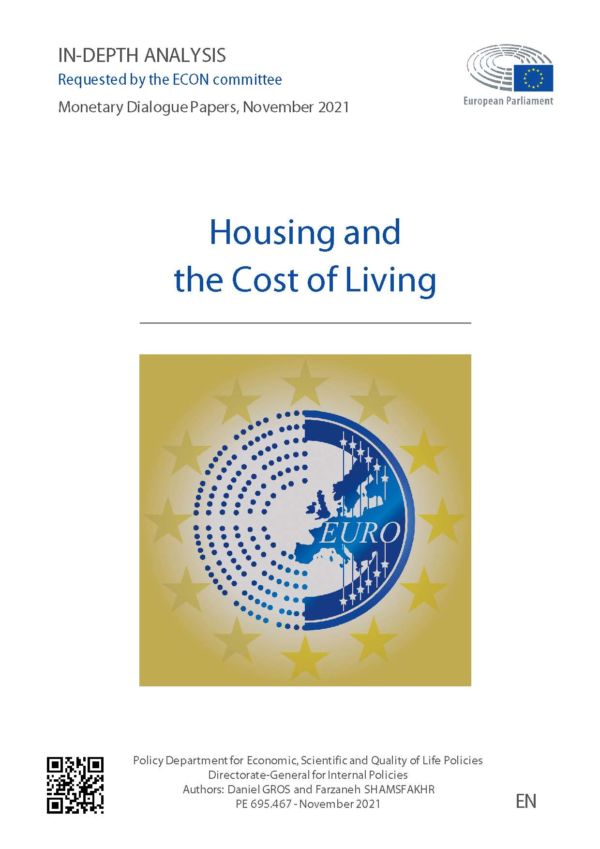Housing and the Cost of Living
The Harmonised Index of Consumer Prices (HICP), which constitutes the sole official measure of inflation in the euro area, leaves out an important part of household expenditure, namely the cost of owner-occupied housing (OOH). Most other developed economies include estimates of OOH in their consumer price index. The existing, even if imperfect, indicator available today […]
Financial Dominance
Financial dominance describes a situation in which a central bank does not dare to tighten its policy stance as this would threaten the stability of the financial system. The danger of this happening is limited at present. The banking system is well capitalised. Private credit has not expanded much, not even during the COVID-19 recession […]
NIRP, Bank Profitability and Risk-Taking
A widespread concern about negative policy rates is that they might depress bank profits and encourage risk-taking. We find that the impact of negative rates per se is limited. Other policy measures (TLTROs, tiered deposits) have largely neutralised the impact of NIRP on bank profits. Asset purchases might have been more important by compressing the […]
Adjusting Support in a K-Shaped Recovery
As recovery from the pandemic continues, fiscal and monetary support can be reduced, at least for industry. Cliff effects are unlikely to arise under a gradual reduction of support. With financial markets in a “risk on” phase, monetary policy support becomes less relevant. The withdrawal of the various pandemic measures should not pose a risk […]
This Time is Different
The COVID-19 recession is different from previous downturns because it originates in demand and supply disturbances which are highly specific to certain sectors (contact-intensive services). This sectoral nature renders aggregate demand policies, including monetary policy, much less effective. The PEPP was essential to prevent a financial crisis in the Spring of 2020; but there is […]
Global Currencies During a Crisis
The current crisis has confirmed the importance of the currency swap lines offered by the Federal Reserve. They enhance the role of the USD as the dominant global currency. However, one should not expect much impact on the international role of the euro when the ECB offers similar currency swap lines. Currency competition is not […]
Reaching a Wider Audience
Central banks are increasingly recognising the importance of communicating with the wider public. We document that interest in monetary policy is intermittent, usually linked to major decisions and/or personnel changes. The ECB should not expect that every one of its decisions is noticed by the general public. The Monetary Dialogue fulfils the typical function of […]
The Two-pillar Strategy of the ECB
Inflation has remained below the ECB’s own target of ‘below, but close to 2%’ for a long time despite massive doses of unconventional policies, suggesting that the present ‘two pillar’ strategy does not work. A review of the strategy will be useful only if it is entrusted to independent experts. Otherwise, it is likely to […]
Global Trends in Inflation
The ECB will not be able to achieve its inflation target over the foreseeable future. Further expansionary measures will have at most a modest impact on financial market conditions and even less on overall demand. Moreover, the impact of any demand stimulus on inflation is highly uncertain. The reasons for low inflation persistence despite tight […]
Does a single monetary policy need a single fiscal counterpart?
The absence of a single fiscal policy in the euro area does not necessarily constitute a problem for the ECB. In a deep financial crisis poorly coordinated national fiscal policies are likely to be insufficient. But outside crisis periods spill-over effects of fiscal policy are likely to be small and of uncertain sign. Moreover, fiscal […]
When Communication becomes the Policy
Non-standard policy measures are intended to work via financial markets. Their effectiveness thus depends on how ECB communication affects the expectations of market participants far into the future. Communication has become as important as the details of the policy measures itself. The success of communication is often measured by short term market reactions, increasingly using […]
ECB non-standard policies and collateral constraints
Collateral constitutes an indispensable lubricant for the financial system. Government bonds constitute the most important source of collateral, for use in inter-bank and repo transactions. But, the vast bond buying program of the ECB in the context of the Public Sector Purchase Programme has not led to any collateral scarcity. Banks still hold very large […]
- 1
- 2












